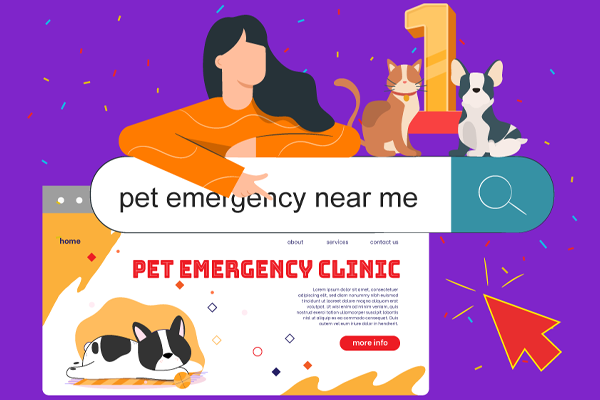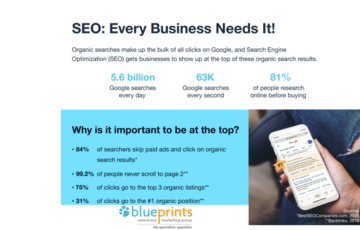How to Get Your Veterinary Practice to Rank on Page 1 of Google
Reading Time: 4 minutes
By Deanna Hendrick, MCM, Director of Digital Marketing
You’ve finally launched your veterinary practice’s new website. It has user-friendly navigation, fantastic photos of your best-looking pet patients, and informative and engaging content. So, you do a quick search to see it “live on Google,” and oh no.
Not this …
The horror …
The agony …
Your new website isn’t listed on page 1!

You finally find your website on page 2. You sink into your chair in despair and then search, “How do I get my website on page 1 of Google?”
Welcome! We are here to show you how to improve your Google ranking, but we also think it’s important to explain the value of SEO and how much more complicated it is than a good-looking website.
What is SEO?
Search Engine Optimization (SEO) is the WORK that goes into a website to get it to rank near the top of Google searches. It is a blend of both the art and science of increasing traffic to a website by strategically helping it rank as highly as possible in online search results.

How Does Google Rank Websites?
Google ranks websites by their relevance, including the code, keywords, meta descriptions, alt-tags (for images), headings, and content throughout the site.
Here are just a few essential on-site ranking factors for Google:
- Optimized code: Google doesn’t care how pretty the site looks. If the code isn’t optimized, then Google will most likely keep your clinic off the first page.
- Mobile-friendliness: If the site isn’t built to be mobile-friendly – meaning it adjusts to the size of the device screen it’s being viewed on – then Google will move your website down in search rankings.
- Backlinks: A backlink is a link on another website that connects to yours. Websites with more relevant backlinks tend to appear higher in search results. However, ensure that the websites that mention your practice are legitimate and authentic. While high-quality backlinks can boost your search ranking, low-quality ones can harm it.
- Speed: Google checks to see how quickly your site loads when considering who to rank first.
- Relevant content: It is critical that the website copy integrates the keywords local pet owners are searching for (veterinary specialist, pet emergency, dog surgeon). A great way to appease Google and ensure your website has fresh and relevant content is to develop a monthly blog that answers pet owners’ questions about your services.
These are just a few selected elements to keep in mind as you look at how to enhance your search ranking. However, Google doesn’t just analyze your site. It also looks at how your business is listed throughout the internet.
What Is Local SEO?
Google and other search engines gather information from several dozen online directories to ensure your veterinary business is authentic and legitimate. This is called Local SEO or Local Search.
Listen carefully: It is imperative that your veterinary hospital or clinic is listed correctly with online directories such as social media, Yelp, Google My Business/Google Maps, Bing, Apple Maps, Yellow Pages, Foursquare, etc. You can improve your search rank by identifying and correcting inaccurate information on online business listings and correcting instances where you are absent from directories and online listing sources.
Another crucial ranking factor for local SEO is online reviews. Yes, we know, veterinary practices have a bit of a love/hate relationship with online reviews. However, Google will typically choose to highlight businesses with a higher overall review rating. That’s why gathering positive reviews is essential, not only to your clinic’s reputation, but also to your SEO strategy. Therefore, continue to ask satisfied clients to share their experiences on Google and Yelp, and always promptly respond to all types of reviews – the good, bad and ugly.
Now What? Are We on Page 1 of Google Yet?
SEO is more of a marathon than a sprint; it takes time. Implementing all of the above tactics is a step in the right direction, but they will not improve your search results overnight. But, adding relevant keywords, enhancing website speed, optimizing code, creating fresh content, and updating online directories consistently and over time will help boost your website’s Google ranking.
However, as a busy veterinary practice manager or owner, it is nearly impossible to run a robust and strategic SEO campaign on your own. So, if appearing on page 1 of Google is important to you (and it should be), search for and invest in the right resources and people to get your practice visible online and to the top of Google – where it belongs!
Need Help with SEO?
We hope this answers your questions and you are ready to get your practice on a well-established, thoughtful, and strategic SEO campaign. However, if you need some help, have more questions, or feel overwhelmed, contact the digital marketing specialists here at BluePrints.